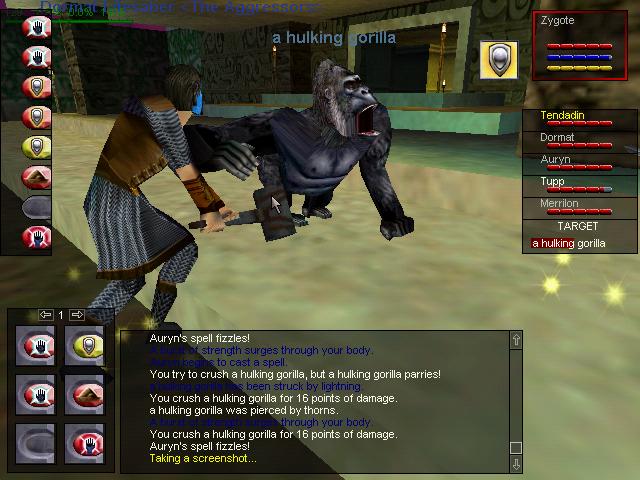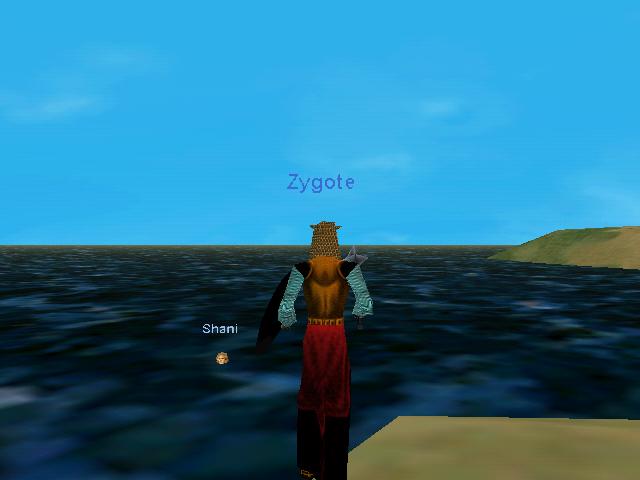Quicklinks
Everquest Journal Two
First I learned that you don’t heal right away unless absolutely necessary. Let the lizard men get angry with the tanks or mesmerized by an enchanter. When the puller is running toward the group, this is the most dangerous time to heal, because then the entire train of MOBs will zero in on the healer. Second keep root memorized because that is the best way to get away from a MOB. Third keep the invulnerability spell memorized for desperate situations. Lastly you could decrease the possibility of attracting aggro by using a buff spell to heal instead of an actual heal spell. Even doing all this and more was sometimes not enough. The ugly truth is the cleric has a giant bulls-eye painted on his chest and occasionally you just have to scrape and claw to survive. To this day, I think playing a cleric in EQ back in 1999 was probably the most challenging class I've ever played.
I probably introduced a few terms in the previous paragraphs that a non-MMOG player wouldn’t understand, so for the benefit of someone who stumbled across this webpage looking for Sloth porn, I'll slap together a little primer. For EQ pioneers like me, the basic group concept of EQ was counter-intuitive to every game we had played in the past. Basically you didn’t go from point A to point B in a dungeon. Instead you located a safe place to stand and sit then you sent one guy out to bring MOBs to the group. This was called camping and pulling. Group members also learned to play to the strength of their class. Many players complained this made classes one dimensional and that is a legitimate argument, but because of class dependency grouping was similar to a team sport. Even though combat was essentially 15 seconds of hitting the same button repeatedly, there was still a considerable amount of skill required to be efficient. This was even more apparent at higher levels.
Anyone could be successful at EQ, but being efficient took practice. A good group could rack up XP at a swift pace, while a group treading water would just be surviving. And that was the simplistic beauty of the game. It took skill to be a good player, but was accessible to players who didn't have the time or skill to invest.
My experience grouping with random people was an enjoyable experience more often than not, but occasionally I encountered some serious turkeys. One of my earliest encounters with said turkey, was with a human shadowknight named Iceage. He spent more time haggling with a non-groupmate over magic items than he did helping the group kill MOBs. WHile we were waiting on him to pull, he'd be trying to shave 2 platinum off a deal for a Bone Bladed Claymore. Worst than him though were the groupmates who panicked as soon as they were under attack and screamed for heals. I met One ‘brave’ tank who would run around in a circle screaming ‘HEAL ME!’ over and over as soon as he got to half health. Luckily Everquest provided a good system for weeding out poor behavior.
Naming Names
Ultima Online had cultivated an entitlement attitude among its playerbase. In UO you didn’t need to rely on other players and you could pretty much do whatever you wanted to other players without consequence. In EQ it was exactly the opposite. It took many months before that sunk into some of the more dense players. As many miscreants learned, acting like a jerk in groups resulted in blacklisting around the server. One of the more famous ninja looters on Mith Marr in 1999 was a high elf wizard named Lurk. Ninja Looting was looting a MOB of its magic item and keeping it. This was essentially stealing from the group since most groups would lotto the item among members or assign the item to the character that could use it best. People who engaged in Ninja Looting or other anti-social behavior found themselves without groups or guilds at higher levels where it was absolutely essential to have groups to advance.
Home | Prev | Next

